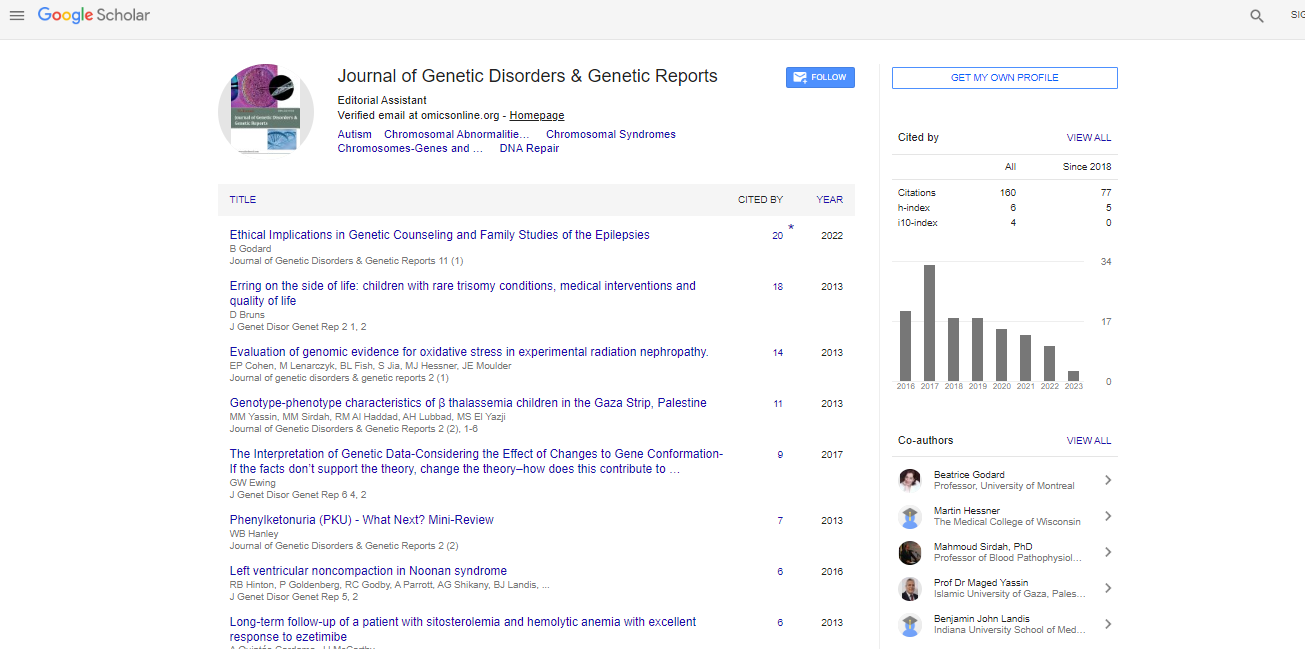Opinion Article, J Genet Disor Genet Rep Vol: 12 Issue: 5
Genetic Reports in Population Health: Current Trends and Implications
Nasser Khan*
1Department of Biotechnology and Genetic Engineering, Jordan University of Science and Technology, Irbid, Jordan
*Corresponding Author: Nasser Khan,
Department of Biotechnology and Genetic
Engineering, Jordan University of Science and Technology, Irbid, Jordan
E-mail: nasserkhan234@gmail.com
Received date: 25 September, 2023, Manuscript No. JGDGR-23-120548;
Editor assigned date: 28 September, 2023, PreQC No. JGDGR-23-120548 (PQ);
Reviewed date: 12 October, 2023, QC No. JGDGR-23-120548;
Revised date: 19 October, 2023, Manuscript No. JGDGR-23-120548 (R);
Published date: 26 October, 2023, DOI: 10.4172/2576-1439.1000226.
Citation: Khan N (2023) Genetic Reports in Population Health: Current Trends and Implications. J Genet Disor Genet Rep 12:5.
Abstract
Description
Genetic reports have emerged as powerful tools in population health, providing valuable insights into individual and collective genetic susceptibilities. Through an analysis of key research findings, ethical considerations, and future directions, this article seeks to contribute to the ongoing discourse on harnessing genetic information to inform public health strategies.
The advent of large-scale genomic studies has ushered in a new era in population health, where genetic reports contribute to our understanding of disease risk, prevention, and health promotion. Genetic reports contribute to the emergence of precision medicine, tailoring healthcare interventions based on an individual's genetic makeup. This approach allows for more accurate diagnoses, personalized treatment plans, and improved outcomes. Genetic reports play an important role in pharmacogenomics, predicting how individuals may respond to specific medications based on their genetic profile. This helps optimize drug selection and dosage, minimizing adverse reactions and maximizing efficacy.
Recent years have witnessed a surge in population-based genetic studies, leveraging advancements in genomics to explore the genetic underpinnings of various health conditions. This section delves into trends such as polygenic risk scores, genome-wide association studies, and the integration of genetic information into epidemiological research. The exploration of genetic diversity within populations and the identification of genetic determinants of complex diseases are pivotal areas of focus.
Implications for disease prevention and health promotion
Genetic reports play an important role in identifying individuals at heightened risk for specific diseases, enabling targeted prevention and early intervention strategies. This section examines how genetic information informs public health policies, preventive measures, and personalized health interventions. The implications of genetic reports in the context of precision medicine and tailored health recommendations are discussed, emphasizing the potential for more effective and efficient healthcare strategies.
Challenges and ethical considerations
While genetic reports hold promise, their integration into population health is not without challenges. Ethical considerations surrounding privacy, consent, and the responsible use of genetic information require careful examination. This section explores the ethical challenges associated with population-wide genetic studies, emphasizing the importance of transparency, informed consent, and protections against unintended consequences.
Genetic literacy and public engagement
Ensuring effective communication and understanding of genetic information among the general population is essential. This section discusses the importance of genetic literacy programs and public engagement initiatives to foster informed decision-making. Strategies for conveying complex genetic concepts in a culturally sensitive and accessible manner are explored, aiming to bridge the gap between genetic research and public understanding.
Future directions and recommendations
As we navigate the evolving landscape of genetic reports in population health, this section outlines potential future directions. Recommendations for enhancing collaboration between genetic researchers, public health practitioners, and policymakers are provided. Genetic reports enable proactive health management by identifying individuals at higher risk for certain diseases. This information facilitates targeted preventive measures and early interventions, potentially reducing the overall disease burden.
Conclusion
Genetic reports in population health represent a dynamic frontier with vast potential for improving public well-being. As we move forward, it is important to strike a balance between harnessing the benefits of genetic information and addressing the ethical and practical challenges that arise. Large-scale genomic studies, such as Genome- Wide Association Studies (GWAS), enable the identification of genetic variants associated with various diseases. These studies contribute to a deeper understanding of the genetic basis of health and disease across diverse populations.




